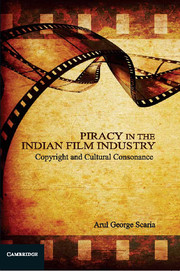Book contents
- Frontmatter
- Dedication
- Contents
- Preface
- Acknowledgments
- List of Abbreviations
- 1 Introduction
- 2 Piracy and the Indian Film Industry
- 3 Copyright Law in India: A Historical, Cultural and Legal Analysis
- 4 Copyright Piracy and Consumers: Insights from an Empirical Survey
- 5 In Search of Optimal Legal and Policy Options
- 6 Conclusion
- Appendix 1 Detailed Description of the Methodology Used in the Study
- Appendix 2 Questionnaire Used for the Empirical Survey
- Appendix 3 Tables
- Bibliography
- Index
1 - Introduction
Published online by Cambridge University Press: 05 June 2014
- Frontmatter
- Dedication
- Contents
- Preface
- Acknowledgments
- List of Abbreviations
- 1 Introduction
- 2 Piracy and the Indian Film Industry
- 3 Copyright Law in India: A Historical, Cultural and Legal Analysis
- 4 Copyright Piracy and Consumers: Insights from an Empirical Survey
- 5 In Search of Optimal Legal and Policy Options
- 6 Conclusion
- Appendix 1 Detailed Description of the Methodology Used in the Study
- Appendix 2 Questionnaire Used for the Empirical Survey
- Appendix 3 Tables
- Bibliography
- Index
Summary
Bachelor Party is a recent Indian movie directed by Amal Neerad. Although the movie did not receive favourable critical reviews or success in the box office at the time of release, it later made headlines across India for another reason. For the first time in the history of India, the Police department in one of the states registered cases against more than 1000 individuals/websites for uploading/downloading the pirated copies of a movie. Although the appropriateness and legal validity of a massive police action solely based on IP addresses is questionable, the incident is a clear illustration of the direction of copyright enforcement actions in India.
But copyright piracy and such enforcement actions against copyright piracy are not just restricted to India. For example, a few months earlier, in an armed operation resembling Hollywood action movies, the New Zealand Police had arrested Kim Dotcom, founder of the cyberlocker service, Megaupload.com. This action was at the request of the Federal Bureau of Investigation (FBI), and the most important charge against Kim Dotcom was the extensive use of his cyberlocker service for online piracy. The domain name and the servers were seized and Kim Dotcom is now facing extradition to the United States. Although the justifiability of extra-territorial copyright enforcement actions is debatable, it is yet another example of the contemporary global approaches in the area of copyright enforcement.
- Type
- Chapter
- Information
- Piracy in the Indian Film IndustryCopyright and Cultural Consonance, pp. 1 - 22Publisher: Cambridge University PressPrint publication year: 2014

